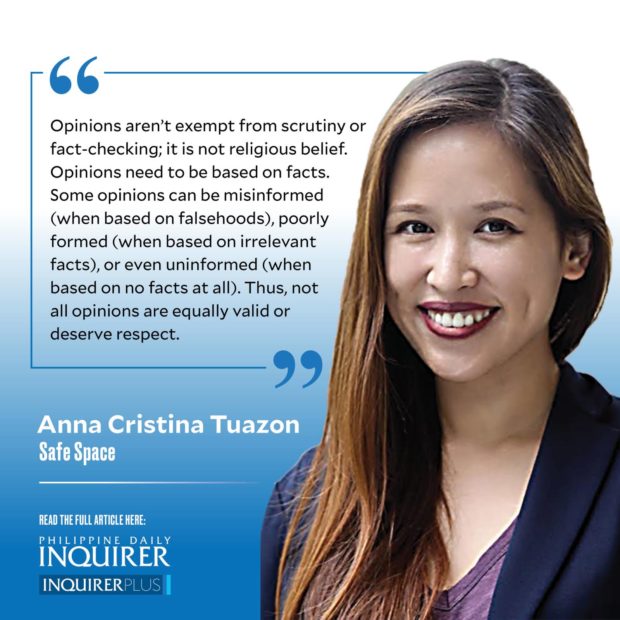‘Respect my opinion’
The anniversary of the 1986 Edsa People Power Revolution is only days away and commemorating it has never felt more urgent and meaningful than in a presidential election season with a Marcos aiming to return to power. Given the undeniable impact of the revolution, where we ended a decades-long dictatorship and re-established a democracy, it boggles the mind that a significant number of Filipinos have rejected the facts of history, ironically risking its repeat. Even now, news of Dr. Naty Castro being taken by police without due process feels like a grotesque déjà vu that serves to remind us that the horror stories of the past are just votes away from becoming our everyday reality.
The higher the stakes — which activates the fight, flight, or freeze response — the more likely that some people will opt out altogether. In an election where the fight for human rights has become so central, a lot of citizens are simply refusing to engage by saying “respect my opinion.” The refrain of some have been “I don’t need to explain my vote,” treating their vote as if it’s merely a matter of personal preference. But a vote is not just an opinion or a private matter—your vote will help determine the fate and well-being of everyone else in this country. So yes, your fellow citizens do deserve an explanation for your vote.
When your vote is complicit in extrajudicial killings with impunity, the intentional removal of human rights protections, and the removal of due process, you don’t just owe the people an explanation, you owe people a sense of accountability. During the last presidential election, I told my friends who supported the winning candidate that I hope they take personal responsibility for the resulting presidency, the same way I would have done if the candidate I voted for had won. I urged them to hold their candidates to their promises and to ensure that their administration does right by its people. I am more than happy to be proven wrong if it means that the country won. However, many fell silent and downplayed the human rights violations if it meant avoiding having to admit that they supported the wrong person. Blindly defending their voting choice, rather than demanding accountability from their supported candidate, is a case of cognitive dissonance. Cognitive dissonance has the power to distort your principles and values if you cannot accept that, sometimes, you’ve made the wrong decision. The willingness to admit to a wrong decision means we are open to change, ensuring a better future.
Opinions aren’t exempt from scrutiny or fact-checking; it is not religious belief. Opinions need to be based on facts. Some opinions can be misinformed (when based on falsehoods), poorly formed (when based on irrelevant facts), or even uninformed (when based on no facts at all). Thus, not all opinions are equally valid or deserve respect. This leads us to the biggest reason why political discourse and engagement seem so impossibly hostile nowadays: We can’t agree on the facts anymore. Fake news—and the lack of personal ethics and responsibility for the information we disseminate—have made facts extremely vulnerable to distortion. It is not just the creators of fake content that are responsible, but every citizen who clicks that “forward” or “share” button without verifying first that the information is true and worthy of dissemination. Fact-checking and research are reduced to looking up things on the internet, whose algorithms usually regurgitate echo chambers that confirm—and extremize—our beliefs. When mere beliefs are presented as facts, then facts no longer exist. To have a healthy and productive debate about politics and the election, we first need to establish the facts. Get your facts from multiple sources. In science, we call this triangulation of data. Get your facts from individuals and organizations who take responsibility for what they write by listening to your grievance and are transparent about their evidence, not from personalities who deny any sense of professional responsibility when called out. Know the difference between offering an opinion and outright lying. If a fact is hard to believe, ask yourself why. Could it be that it forces you to question what you’ve been taught? Are your stereotypes against certain groups and parties so strong that you automatically discredit everything they say? Ultimately, facts require evidence, not belief. Respect the facts first, then I’ll listen to your opinion.
aatuazon@up.edu.ph





















